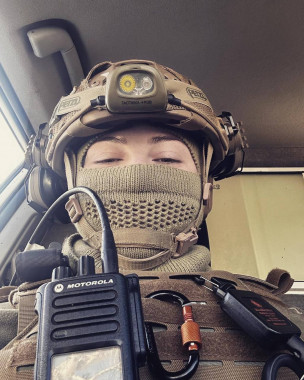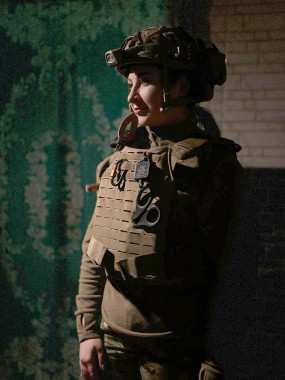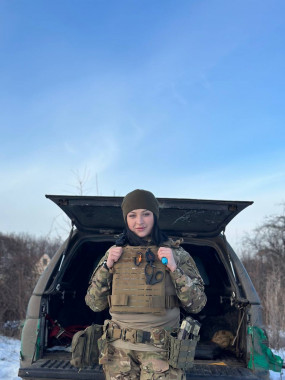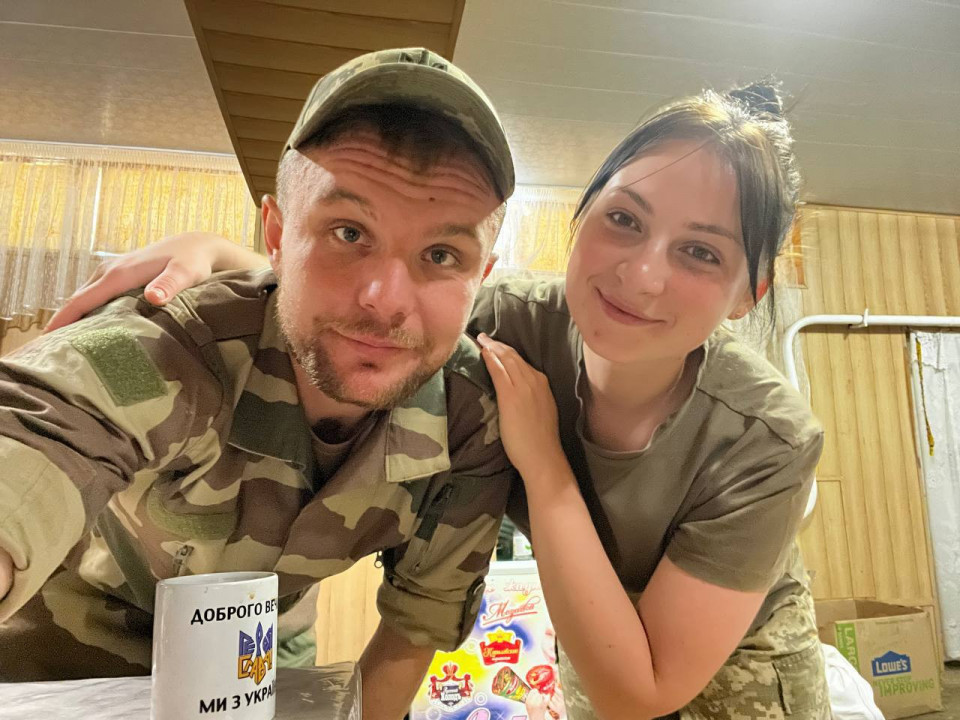
Heroes of Ukraine. Iryna Melnyk (Sabrina): the hardest part was looking for the wounded in the trees
The young woman took part in the battles for Zolote in the Luhansk region and near Bakhmut. Iryna's story is told by Espreso
After graduating from college, she went straight to the front
For several years during the war, Iryna Melnyk, with the call sign Sabrina, was a military medic with the 24th Brigade named ater King Danylo. Since 2019, she has been saving soldiers in the Donetsk region, and met the full-scale Russian invasion in Zolote, Donetsk region, and is still performing tasks on the front lines.
She has been in the army for four years. She joined the AFU right after graduating from medical school. At the same time, she was studying psychology at the university. However, she did not want to work in a civilian hospital, but decided to help the military. She spent a month thinking about her decision, but finally collected her documents, went to the military recruitment office and signed a contract.
"I had no military in my family. All my friends and close relationships came later," says Iryna. - "I was immediately assigned to the 24th. I remember it was before Easter on a Friday. I was sitting in the military recruitment office, and on Tuesday the women had to go on training. The only chance to get into the army was to go to the 24th “Royal” Brigade. So she didn't hesitate and went to the train station. At the time, women from the military hospital were coming, and they had also signed a contract. We started studying there."
Her first combat zone was Marinka, Donetsk region. At that time, a positional war was formed. After a month on the front line, Iryna got her first injury. She had to save two "heavy" soldiers.
"It was the first time," Iryna recalls of the first wounded. "I was opening my bag, looking for something, the medicine was in front of me, but I couldn't find anything. Although I can't say that I panicked. Then I had one heavy injured soldier. He had multiple shrapnel wounds all over his body, he was completely cut by shrapnel. I provided all the first aid and he was evacuated. A week later I was informed that he died in a hospital in Dnipro. The other one was also wounded in the chest and had several fingers torn off. To be honest, I learned almost everything about the work of a combat medic at the place where the unit was located. I learned everything during my work."

photo: archive of Iryna Melnyk
While Iryna was saving soldiers in the war, she was expelled from the university. Because of the fighting, she was unable to attend the university. Only a year later she managed to resume her studies. Back then, in Marinka, the military were allowed to go to their permanent deployment points every few months. And then there was the Battle of Svitlodarsk.
"We were replacing soldiers from the National Guard. They told us that there were many wounded, everyone was in a fighting spirit," Sabrina recalls. "I was a little scared when I arrived, because I thought there would be a lot of wounded. I was very worried. But the whole rotation was wonderful. Only in the fall was there one lightly wounded in the leg, but he was quickly taken away. All the time on this rotation, I had a four-hour shift, and in my free time I conducted tactical medicine courses for soldiers."
We thought we would be encircled: the battle for Zolote
In June 2021, the soldiers of the 24th Brigade arrived in the town of Zolote in Luhansk Oblast. It was one of the longest rotations for the brigade. Iryna recalls that the rotation was promised first at the end of November, then in December, and then in January there was no rotation. Then everyone began to realize that something was wrong. And the closer we got to a full-scale invasion, the more the situation became tense.
A week before February 24, the Russians began to shell more intensively. And what was unusual was that they were shelling the rear areas.
"I remember the first hits of self-propelled artillery systems, they all flew over us because they were flying to the rear," the soldier recalls. "And on February 24, 2022, I was on duty from six to nine in the morning. When I returned from duty to our post, everyone was very concerned. I had missed calls from my mom and boyfriend. In fact, we did not feel the beginning of it. We heard the news from a small TV that we had at our position."
The first battles in the Zolote area took place when there was a breakthrough to the fifth company. These were positions to the left from Zolote. It was only then that the city was of interest to the Russians. But the Ukrainian military blew up the bridge, so the occupiers had no chance to get to Zolote. So they began to storm Popasna, which was on the other side from the settlement. The 24th Infantry Battalion was stationed there.
"In Zolote, we first lived in a house, and then moved to the basement. In the evening, we would go out and in the direction of Popasna, at 9 pm, when it was already dark, the sky was so bright, as if it was noon. Everything was on fire at that time. And it was scary. Because in the first days, there was a breakthrough to Stanytsia Luhanska and Krymske on the one side, and Popasna on the other side was stormed. Then we realized that we could be encircled," Iryna recalls.

photo: archive of Iryna Melnyk
The military woman was in Zolote twice. The first time she stayed until April. And in early July, she was sent there again. In the summer, she worked in a medical evacuation team. The positions held by the brigade were near the Lysychansk oil refinery. The task was to cover the flanks when the brigade was leaving Zolote.
"In the first days, when the brigade was leaving, the Russian troops followed Ukrainian troops. They came between two battalions on the left flank. That's when we got the first wounded," says Iryna. "There was one very heavy injured company commander, he was evacuated. He was wounded in the stomach. I am almost convinced that there was internal bleeding. In fact, there was nothing on his body, only a small hole near the stomach. They brought him to us, connected everything and took him to the transfer point. Later, the commander of the machine gun platoon came to see me, and his arm was in the "meat", although it was bandaged. I helped him, fixed everything, reattached it, anesthetized it and went to get the company commander, who was being taken away. There I saw that he was not saved. At that time, they also took him to Chasiv Yar and to the hospital in Bakhmut. They were still working normally. Then there were more wounded with arms and legs. However, when this happens, time flies so fast that you don't notice anything. It's like a conveyor belt. The task is to keep the soldier alive. It was such a hellish two days, and then it calmed down a bit."

photo: archive of Iryna Melnyk
Basically, all the aid at the level of the battalion's medical center took place on the road. The medics received the soldier at the point of transfer of wounded, connected him on the way, checked all the bandages and stickers and then handed him over to doctors. She explains that saving a soldier has many steps. A combat medic works in the positions, fires, shoots, supports his company with various firepower, but when there is a wounded soldier, he provides first aid. He organizes his own collection point for the wounded and then sends them to the next stage of evacuation. Iryna has already worked at the next stage - evacuation. We took them directly to the stabilization point of the medical unit or to the transfer point.
"I remember an incident," Iryna continues. "It was at night, about eleven o'clock. I, another girl medic, and a driver were on the evacuation. We were told that we had to take a person for evacuation. There was shelling. We had to drive along the highway, where there were places where our evacuation points were located. We had to go to the end. And the driver says, they are shooting something, the soldier is not in serious condition, so we can drive through the field. So we are driving and hit a dead end. We got lost and almost drove into the occupiers' positions. Because it was the Bakhmut-Lysychansk highway, which was under fire, and part of the road was no longer ours. As a result, we took the wounded man and started looking for that road. I remember the guy's name was Oleh, he was connected, we talked to him the whole way, he told us where he was from, his name, how many girlfriends he had, whether he had a serious relationship. Then we sang with him. By the time we got him to the stabilization center, we had used up his entire IV. And he got out of the car as if everything was fine. He just stood up and went to the medics. We did all the stabilization work for the whole trip. And it was only because we were driving him for a very long time, because we couldn't find a normal road."
One of the tensest days was the first of January. The adversary entered our trench and they started throwing grenades
Then there were battles in the Bakhmut direction. The brigade was standing in the direction of Opytne. The enemy was on our left side and in front. In the early days, the evacuation point was very close to the occupiers. It was closer than a mortar. There were locations 1.5 kilometers to the point, and there were 300-400 meters to the front line.
"In Bakhmut, there were times when we could only load the wounded at the evacuation point, drive off the road beyond the crossing in Bakhmut, stand between the houses and examine them again and provide additional assistance. Sometimes it was impossible to do this before because of the shelling. In addition, it was very difficult to find the wounded, because some company medics were already wounded and the military from the companies directly handed us the wounded for evacuation. Because they did not have a medic. It happened that they sent people for evacuation without communication. We would arrive there, look for the wounded and shout through the window where there were injured soldiers. And if we heard a voice, we would drive up and take them away. One of those intense days was the first of January. A lot of work had begun in the afternoon. Then the enemy entered our trench, and our troops and the occupiers were just throwing grenades. The contact was so close. There were many wounded then. We were taking the wounded during the day and the dead in the evening."

photo: archive of Iryna Melnyk
Then the military took back the position, and the enemy never entered. There were losses, but there were no results of enemy breakthroughs.
Today, the young woman continues to serve in the army. She lost her beloved in the war, so she continues his work. She also gets an officer's rank. But she doesn't plan ahead, she just wants to contribute to Ukraine's victory.
- News











































